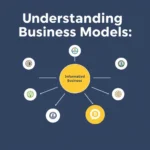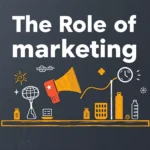In today’s competitive business environment, marketing is no longer just a tool for promoting products or services—it is a key driver of business growth and success. Whether you are a small startup or a large corporation, the effectiveness of your marketing strategy can significantly impact your company’s ability to attract customers, build brand loyalty, and increase revenue. In this article, we will explore the crucial role of marketing in business success, the various types of marketing strategies, and how you can create an effective marketing plan to help your business thrive.
Why Marketing is Crucial for Business Success
- Attracts New Customers
- One of the primary functions of marketing is to attract new customers. Through targeted advertising, content creation, and other promotional strategies, businesses can reach potential customers who may not have known about their products or services. Marketing helps raise awareness about your brand and offerings, leading to customer acquisition.
- Builds Brand Awareness and Recognition
- Marketing plays a critical role in building brand awareness. By consistently presenting your brand message, values, and unique selling points (USPs), you create a memorable image in the minds of consumers. The more people recognize your brand, the more likely they are to choose your product or service when the need arises.
- Increases Customer Loyalty
- Effective marketing goes beyond attracting new customers; it also focuses on retaining existing ones. By staying connected with customers through personalized communication, special offers, and loyalty programs, marketing can help nurture long-term relationships and enhance customer loyalty. Loyal customers are more likely to return, refer others, and provide positive testimonials that can further enhance your brand reputation.
- Drives Revenue and Profitability
- At the core of every marketing effort is the goal of driving revenue. Whether through increased sales, higher conversion rates, or improved customer retention, marketing is designed to generate income for the business. A well-executed marketing strategy can lead to higher profits by efficiently targeting the right audience with the right message.
- Helps Differentiate Your Business from Competitors
- In a crowded marketplace, it’s essential to stand out from the competition. Marketing helps you communicate your unique value proposition to consumers, showing them why your product or service is better or different from what’s available from competitors. This differentiation can be the deciding factor in whether a customer chooses your business over another.
- Supports Business Growth and Expansion
- For a business to grow, it needs to continually attract new customers, enter new markets, or introduce new products and services. Marketing supports this growth by identifying new opportunities and creating strategies to exploit them. Whether expanding to new geographic locations, launching a new product, or reaching a different customer segment, marketing drives the awareness and demand needed for growth.
Types of Marketing Strategies
- Digital Marketing
- What is it?: Digital marketing refers to marketing efforts that use the internet and electronic devices to reach consumers. It includes various channels such as social media, search engine optimization (SEO), email marketing, content marketing, and online advertising.
- Why is it effective?: Digital marketing offers businesses the ability to reach a global audience at a fraction of the cost of traditional marketing methods. It allows for precise targeting, measurable results, and real-time engagement with customers.
- Key Strategies:
- Search Engine Optimization (SEO): Optimizing your website and content to rank higher on search engine results pages (SERPs) increases your visibility and attracts organic traffic.
- Social Media Marketing: Engaging with customers on platforms like Facebook, Instagram, LinkedIn, and Twitter helps build a community, generate leads, and drive sales.
- Email Marketing: Sending targeted, personalized emails to your customers and prospects can help build relationships and drive repeat business.
- Content Marketing: Creating and sharing valuable content, such as blogs, videos, and infographics, educates your audience, establishes authority, and builds trust.
- Traditional Marketing
- What is it?: Traditional marketing includes methods like print advertisements, TV and radio ads, direct mail, billboards, and event sponsorships. These are offline channels that have been around for decades and are still effective for reaching certain demographics.
- Why is it effective?: Despite the rise of digital marketing, traditional marketing methods still have value, especially for local businesses or businesses targeting older demographics. They can build brand awareness in a more tangible way, creating lasting impressions.
- Key Strategies:
- Print Advertising: Newspapers, magazines, and brochures allow businesses to showcase their products or services in a physical format.
- Television and Radio Ads: These mass media channels allow businesses to reach a wide audience and create brand recognition.
- Direct Mail: Sending catalogs, flyers, or postcards directly to potential customers allows businesses to target specific neighborhoods or demographics.
- Sponsorships and Events: Participating in or sponsoring local events helps increase brand visibility and allows businesses to connect with the community.
- Influencer Marketing
- What is it?: Influencer marketing involves partnering with individuals who have a large and engaged following on social media or other platforms. These influencers promote your product or service to their audience in a way that feels authentic and relatable.
- Why is it effective?: Influencer marketing leverages the trust that influencers have built with their followers. When influencers recommend your product, it can significantly increase brand credibility and generate leads.
- Key Strategies:
- Product Reviews and Endorsements: Influencers review or endorse your products, showcasing their benefits to their audience.
- Collaborations: Co-creating content or offering exclusive promotions through influencers can help boost engagement and drive conversions.
- Referral Marketing
- What is it?: Referral marketing encourages your existing customers to recommend your product or service to others in exchange for rewards or incentives. Word-of-mouth marketing is one of the most powerful forms of marketing.
- Why is it effective?: People trust recommendations from friends and family more than they trust traditional advertising. Referral marketing harnesses this trust, turning your customers into brand advocates.
- Key Strategies:
- Referral Programs: Offer discounts, free products, or other incentives to customers who refer others to your business.
- Customer Testimonials and Reviews: Encourage satisfied customers to share their experiences on review sites or on social media.
How to Create an Effective Marketing Plan
- Define Your Target Audience
- The first step in creating a successful marketing plan is identifying who your target audience is. Knowing your customers’ demographics, interests, and pain points allows you to create more targeted and personalized marketing messages.
- Set Clear Marketing Goals
- Establish specific, measurable, achievable, relevant, and time-bound (SMART) goals for your marketing efforts. Whether it’s increasing brand awareness, generating leads, or improving customer retention, having clear objectives ensures that your marketing efforts stay focused and aligned with your business goals.
- Choose the Right Marketing Channels
- Not all marketing channels are right for every business. Consider where your target audience spends their time and focus your efforts on those platforms. If your audience is active on social media, invest in social media marketing. If you have a local business, traditional methods like print ads or direct mail might be more effective.
- Develop a Consistent Brand Message
- Consistency in your brand message is key to building trust and recognition. Whether through visual elements like logos and colors or verbal elements like tone and language, your brand should present a unified message across all marketing channels.
- Measure and Optimize
- Marketing isn’t a one-and-done activity. Regularly measure the effectiveness of your marketing campaigns using key performance indicators (KPIs) such as website traffic, conversion rates, and customer engagement. Based on your findings, make adjustments to your strategy to improve results.
Conclusion
Marketing is a vital component of any business’s success. It not only helps attract new customers but also fosters brand loyalty, drives revenue, and supports long-term growth. By utilizing the right marketing strategies and creating a well-thought-out marketing plan, businesses can gain a competitive edge, connect with their audience, and ultimately achieve their goals. Whether you focus on digital marketing, traditional methods, or a mix of both, a strong marketing strategy is essential for navigating the ever-changing business landscape.










